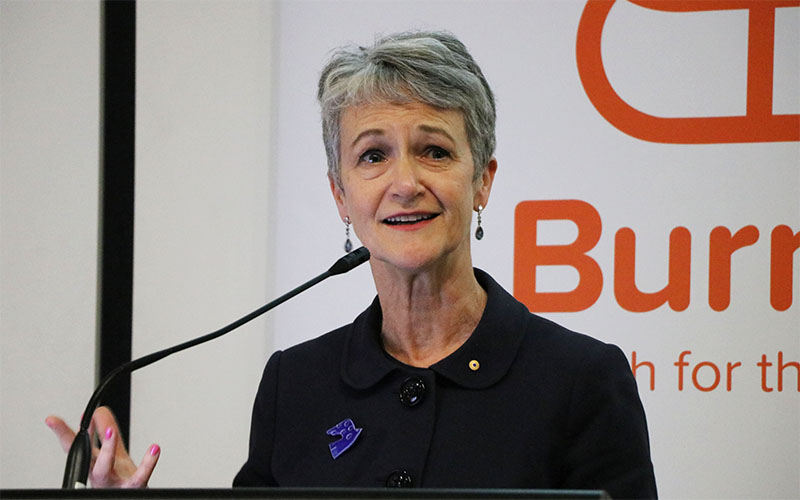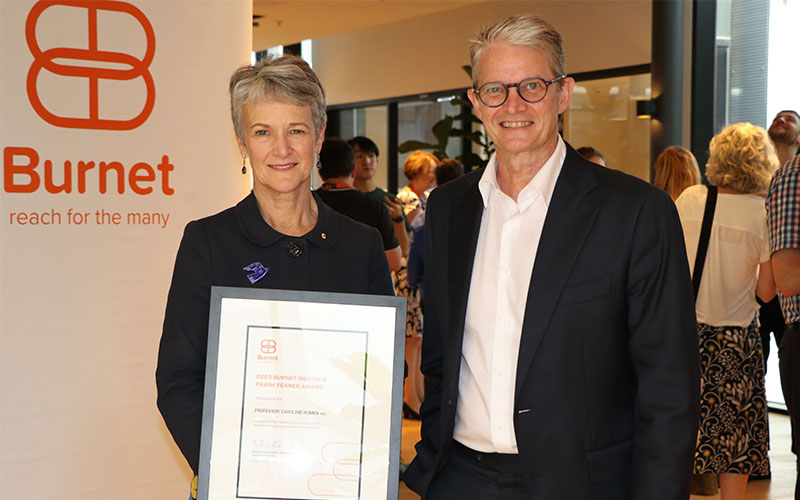
Burnet Institute Deputy Director (Equity, Diversity and Inclusion) Professor Caroline Homer AO, is the winner of the Fenner Award for 2023 — named in honour of the esteemed Australian virologist, Frank Fenner.
The Institute’s most prestigious internal prize, the Fenner Award acknowledges significant contribution to Burnet’s vision and purpose in medical research and public health.
With more than 30 years of experience in the sector, Professor Homer has led research and development projects in midwifery, health services delivery, reproductive, maternal and newborn care, and healthcare human resources in Australia and across Asia-Pacific.
"If 95 per cent of women had a midwife, you would reduce maternal deaths by 85 per cent … you would reduce stillbirths by 85 per cent, you would reduce neonatal deaths by 85 per cent," Professor Homer said in delivering the 2023 Fenner Lecture.
"If we have midwives, we will save lives."
Professor Homer shared what she described as a non-linear journey to get to where she is today – from migrating with her family from Rhodesia to Australia without passports, to settling in Queensland, becoming a nurse and travelling back to Africa, as a midwife in the early 1990s when HIV was rampant.
"[In Malawi] We knew that 30 per cent of the women having babies in our hospitals were HIV-positive. I had never even thought that a woman would die in childbirth from our training in Australia, let alone having a ward full of women die,” she said.
"It was a huge wake-up call to what the real world was about."
Professor Homer said she returned to Australia with a renewed enthusiasm for midwifery and met mentors who supported her in completing a PhD, without an undergraduate degree.
Now she tries to do the same for others.
"I'm proud of my real commitment to strengthening the capacity of others. I feel I've had huge opportunities in my career to be strengthened, to be capacity built, to be enabled," she said.
"So the work I do now is focused on thinking about how we support other people."
A sense of injustice from seeing the opportunities women miss because of discrimination, and of women who’ve faced family and gender-based violence, have since defined her work.

In addition to her Deputy Directorship which includes responsibility for oversight of equity, diversity and inclusion across the Institute, Professor Homer is Co-Head of Burnet’s Global Women’s and Newborn’s Health Group alongside Professor Joshua Vogel.
Professor Homer’s research includes a Lancet study that identified a global shortage of 900,000 midwives, based on data before the COVID-19 pandemic. The numbers are now estimated to be much worse.
"A woman dies every two minutes in the world due to childbirth … We now need to work globally around breaking the silence around stillbirth," she said.
"Two million deaths a year of stillbirths is a lot of sadness and every one of those babies gets remembered by their mothers."
An Emeritus Professor of Midwifery at the University of Technology Sydney, Professor Homer was elected a Fellow of the Australian Academy of Health and Medical Sciences, and in 2021 was appointed Chair of the Council of the National Health and Medical Research Council (NHMRC) to June 2024.
She was the 2022 winner of the Elizabeth Blackburn Award, presented annually to the highest-ranked applicant for an NHMRC Investigator Grant in health services research.
Professor Homer has been named by The Australian as one of nine researchers who are world leaders in their fields. She holds the highest number of global citations from pregnancy and childbirth papers published in the top 20 journals in the last five years.
Professor Homer was also the inaugural winner in 2018 of Burnet Institute’s Alastair Lucas Prize for Medical Research.
